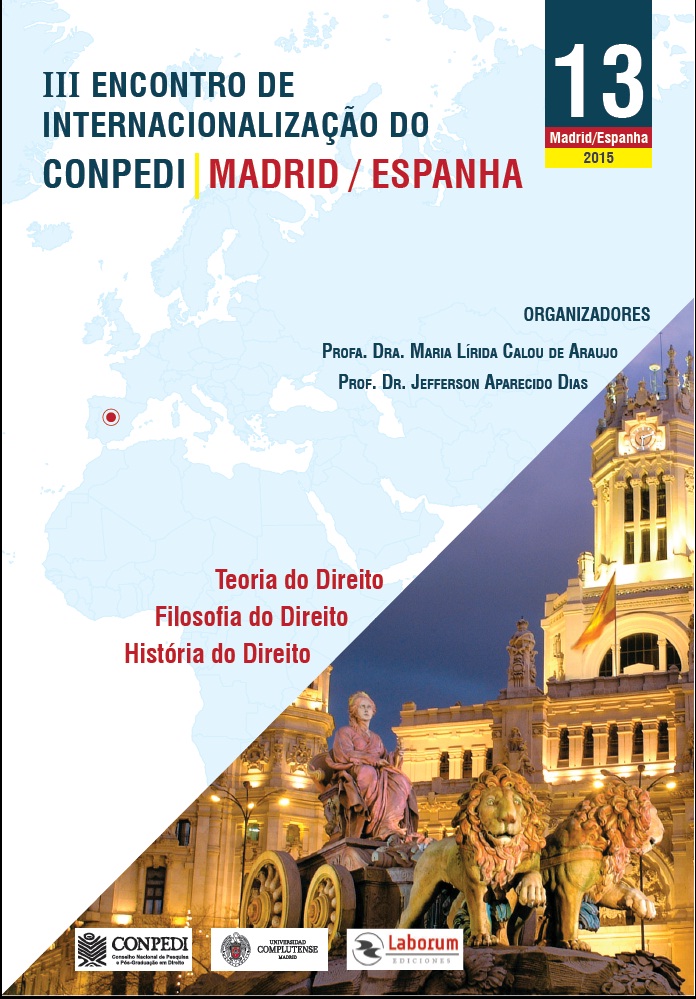Natural Law , Positive Law and ss Tupinambás in Michel Montaigne's Essays
Main Article Content
Abstract
This article aims to present the vision of the Renaissance philosopher Michel de Montaigne about natural law and positive law in the work The Essays where the Tupi- nambás serve as stylistic resource for the author to expose his ideas about nature. In the book, Montaigne devotes a chapter to the Brazilian Indians in order to demonstrate the Europeans distante in relation to natural law and also the impossibility of civilized people to access natural laws. As a result, Montaigne understands that positive law is self -referential, a mere product of art characterized by “mystical foundation of the laws au- thority,” a term that indicates the impossibility of transcendent foundation for the laws.
Downloads
Article Details
Autores que publicam nesta revista concordam com os seguintes termos:
O(s) autor(es) autoriza(m) a publicação do texto na da revista;
O(s) autor(es) garantem que a contribuição é original e inédita e que não está em processo de avaliação em outra(s) revista(s);
A revista não se responsabiliza pelas opiniões, idéias e conceitos emitidos nos textos, por serem de inteira responsabilidade de seu(s) autor(es);
É reservado aos editores o direito de proceder a ajustes textuais e de adequação às normas da publicação.
Autores mantém os direitos autorais e concedem à revista o direito de primeira publicação, com o trabalho simultaneamente licenciado sob a Licença Creative Commons Attribution que permite o compartilhamento do trabalho com reconhecimento da autoria e publicação inicial nesta revista.
Autores têm autorização para assumir contratos adicionais separadamente, para distribuição não-exclusiva da versão do trabalho publicada nesta revista (ex.: publicar em repositório institucional ou como capítulo de livro), com reconhecimento de autoria e publicação inicial nesta revista.
Autores têm permissão e são estimulados a publicar e distribuir seu trabalho online (ex.: em repositórios institucionais ou na sua página pessoal) a qualquer ponto antes ou durante o processo editorial, já que isso pode gerar alterações produtivas, bem como aumentar o impacto e a citação do trabalho publicado (Veja O Efeito do Acesso Livre) emhttp://opcit.eprints.org/oacitation-biblio.html
References
MONTAIGNE, Michel. Les Essais. Ed. Pierre Villey, V.-L. Saulnier. Paris: PUF, 2004 (col. Quadrige).
______. Os Ensaios: Livros I, II e III. Trad. de Rosemary Costhek Abílio. São Paulo: Martins Fontes, 2009.
Fontes Secundárias:
AZAR FILHO, Celso Martins. Natureza e Lei Natural nos Ensaios de Montaigne. Princípios (UFRN. Impresso), Natal, v. 4, p. 51-71, 1996.
BARROS, Alberto Ribeiro G. de. Humanismo Jurídico. O que nos faz pensar. Rio de Janeiro. N. 27, p. 09-26, maio de 2010.
BERNS, Thomas. Violence de Loi à la Renaissance: L’Origine du Politique chez Machiavel et Montaigne. Paris: Kimé, 2000.
BIRCHAL, Telma de Souza. O Eu nos Ensaios de Montaigne. Belo Horizonte: UFMG, 2007.
BLANCHARD, Marc E. Trois Portraits de Montaigne: Essai sur la Représentation à la Renaissance. Paris: A.-G. Nizet, 1990.
CAVE, Terence. The Cornucopian Text: Problems of Writing in the French Renaissance. New York: Oxford University, 2002.
CONTINENTINO, Ana Maria. Horizonte Dissimétrico: Onde se Desenha a Ética Radical da Desconstrução. In: Desconstrução e Ética: Ecos de Jacques Derrida. Rio de Janeiro: PUC, 2004.
EVA, Luiz. A Figura do Filósofo: Ceticismo e Subjetividade em Montaigne. São Paulo: Loyola, 2007.
FRIEDRICH, Hugo. Montaigne. Trad. Robert Rovini. Paris: Gallimard, 1968. (Bibliothèquedes Idées).
______. Humanismo Occidental. Trad. Rafael Girardot. Buenos Aires: Editorial Sur, 1973.
SCOLARICK, André. Experiência e Moralidade no Último dos Ensaios de Montaigne. São Paulo, 2008. Dissertação. (Mestrado em Filosofia) – Faculdade de Filosofia, Letras e Ciências Humanas. Universidade de São Paulo.
STAROBINSKI, Jean. Montaigne em Movimento. Trad. Maria Lúcia Machado. São Paulo: Companhia das Letras, 1992.
STRAUSS, Leo. Direito Natural e História. Trad. Miguel Morgado. Lisboa: Edições 70, 2009.
TODOROV, Tzvetan. O Jardim Imperfeito: O Pensamento Humanista na França. Trad. De Mary de Barros. São Paulo: USP, 2005.
______. A Conquista da América. Trad. De Beatriz Perrone-Moisés. São Paulo: Martins Fontes, 2011.
TOURNON, André. Montaigne: La Glose et L’Essai. Paris: Honoré Champion Éditeur, 2000.
______. Justice Oblige. Bulletin de la Societé des Amis de Montaigne. 8, n. 21-22, p. 71-79, Jan/Jun 2001.
______. Montaigne. Trad. de Edson Querubini. São Paulo: Discurso Editorial, 2004.
VILLEY, Michel. O Direito e os Direitos Humanos. Trad. de Maria Ermantina de A. P. Galvão. São Paulo: Martins Fontes, 2007.





